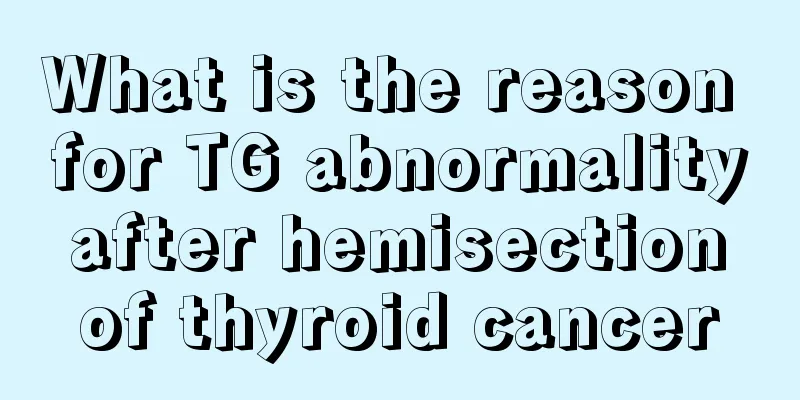Is rectal cancer inherited by males or females?

|
Hereditary colorectal cancer is rare in my country, especially patients with hereditary non-polyposis colorectal cancer (Lynch syndrome), which has not attracted the attention of general surgeons in China. Many Lynch syndrome patients are treated as sporadic colorectal cancer. In fact, there are great differences between the two in diagnosis and treatment. So, is rectal cancer inherited in males or females? Let's learn about this issue below. 1. Hereditary non-polyposis colorectal cancer Hereditary non-polyposis colorectal cancer (LS) is the most common syndrome of hereditary colorectal cancer, accounting for 2%-3% of all colorectal cancers. It is mainly caused by germline mutations in the mismatch repair genes MLH1, MSH2, MSH6 and PMS2. Mutations in MLH3, PMS1 and EXO1 have also been reported to be associated with LS. The disease is inherited in an autosomal dominant manner, but due to incomplete penetrance, age of onset, screening and preventive surgery, not all parents of LS-related gene mutation carriers are cancer patients. The LS family screening criteria in my country are: there are at least 2 cases of histologically confirmed colorectal cancer patients in the family, 2 of which are parents and children or siblings, and meet any one of the following conditions: (1) At least one patient had primary colorectal cancer (including adenoma); (2) at least one case of colorectal cancer occurred before the age of 50; (3) At least one family member suffers from LS-related extraintestinal malignancies (gastric cancer, endometrial cancer, small intestinal cancer, renal pelvis and ureteral cancer, ovarian cancer, and hepatobiliary system cancer). 2. Classic familial adenomatous polyposis Familial adenomatous polyposis (FAP) is also a colorectal cancer susceptibility syndrome in which patients have hundreds or thousands of polyps in the colorectum. FAP is an autosomal dominant genetic disease that often has extracolonic manifestations, including gastric and duodenal polyps, bone tumors, dental abnormalities, desmoid tumors, thyroid and brain tumors, congenital hypertrophy of the retinal pigment epithelium, and epidermoid cysts. Mild familial adenomatous polyposis Classic FAP occurs in adolescence, while patients with mild familial adenomatous polyposis (AFAP) often develop polyps in adulthood. Although some patients require surgical colectomy, some patients can be controlled by endoscopic treatment. Furthermore, patients with AFAP have a lower incidence of extracolonic tumors and desmoid tumors. Both FAP and AFAP are caused by mutations in the APC gene. APC is a tumor suppressor gene that plays a negative regulatory role in the wnt signaling pathway and is associated with cell migration, adhesion, transcriptional activation, and apoptosis. APC gene mutations lead to the production of truncated protein products, which promote the occurrence and development of tumors. Cases of colorectal cancer caused by APC gene mutations account for approximately 0.5% of all colorectal cancer patients; however, this number is decreasing with early screening of high-risk family members and preventive surgical resection. MUTYH-associated polyposis MUTYH-associated polyposis (MAP) is an autosomal recessive genetic disease characterized by multiple colorectal polyps. Its clinical manifestations are similar to those of FAP and AFAP, but the average age of onset is close to middle age, around 50 years old. Treatment is similar to that for FAP and AFAP and can be surgical or endoscopic, depending on the number and burden of polyps. Population-based studies have found that approximately one-third of carriers of MUTYH gene mutations develop colorectal cancer without colorectal polyps. 5. Familial colorectal cancer type X Familial colorectal cancer type X means that three relatives in two generations suffer from colorectal cancer, one of whom is diagnosed before the age of 50, but does not carry mismatch repair genes or have tumors caused by mismatch repair mutations. |
<<: Is it possible that rectal cancer is inherited?
>>: How is rectal cancer inherited
Recommend
Is the cure rate of lung cancer high?
Does lung cancer have a high cure rate ? What is ...
4 tests to confirm gastric cancer bone metastasis
The patient is a 57-year-old male. He was diagnos...
The difference between raw and cooked coix seeds
In our impression, raw food is usually not eaten,...
How long is skin cancer considered early stage
In my country, the incidence of skin cancer is ve...
Urine formation process
The most obvious activity of metabolism is excret...
Effect of anesthetics on heart rate
The most basic examination before surgery in the ...
Left lower forehead lymph node swelling
There are many lymph nodes in our chin area, and ...
Organic vegetable standards
Now as the quality of life is getting better and ...
Surgical treatment of malignant lymphoma in different parts of the body
Malignant lymphoma can occur in the gastrointesti...
What should I do if my hands itch and get blisters?
I felt my hands were itchy, so I scratched them a...
The difference between food energy and calories
Energy is a relatively large concept, and heat al...
How to wash bras
Bras are clothes that women come into close conta...
Liquid foundation that nourishes the skin without causing acne
People who frequently change their foundation wil...
What to do if facial muscle twitches?
Uncontrolled twitching of facial muscles may not ...
What's going on with a dark yellow face?
A rosy complexion can make women look very cute a...









